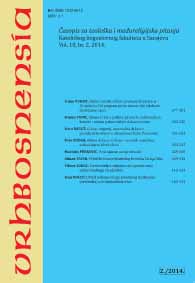ODNOS DRŽAVE I CRKAVA – VJERSKIH ZAJEDNICA U DANAŠNJEM BH-DRUŠTVU
RELATIONSHIP BETWEEN THE STATE AND CHURCHES AND RELIGIOUS COMMUNITIES IN CONTEMPORARY SOCIETY IN BOSNIA AND HERZEGOVINA
Author(s): Pero SudarSubject(s): Politics / Political Sciences
Published by: Katolički bogoslovni fakultet
Keywords: churches; religious communities; state; relationship; Catholic perspective; differentiation; collaboration; healthy secularism; selectivity; ideological intolerance; contractual relations; nationalism; secular state; common good.
Summary/Abstract: This paper strives to present the relationship that exists between the state and churches and religious communities in the social context of Bosnia and Herzegovina, from three perspectives. The article begins by explaining the distinct jurisdiction of churches and religious communities on the one hand and the state on the other, and their cooperation for the benefit of the common good. Freedom for the churches and religious communities and a healthy secularism on the part of the state are prerequisites for fruitful collaboration. Therefore, instead of detachment and indifference, the paper advocates a better solution: differentiation and cooperation between churches and religious communities on the one hand and the state on the other. A secular state is seen as the only appropriate and feasible framework for acceptable relations between the state and the churches and religious communities in Bosnia and Herzegovina’s current social context because that context is deeply marked by a multi-confessional presence. In a minimal way, Bosnia and Herzegovina’s legal framework, in principle, gives sufficient space not only to democratic appreciation but to mutual respect and fruitful cooperation between the state and churches and religious communities. However, this is only on paper, and relations between the state and churches and religious communities are conducted according to the individual discretion of party officials and bureaucrats, and this may be diametrically opposite to what is prescribed by law. The signing of the Intergovernmental Agreement between the Holy See and Bosnia and Herzegovina could and should be an opportunity for legislation in Bosnia and Herzegovina that further strengthens and democratizes the important subject of relations between the state and churches and religious communities. The Agreement guarantees that what is accorded to the Catholic Church should, on the principle of non-discrimination, also be accorded to other churches and religious communities. However, with the establishment of the Interreligious Council the opposite has been allowed to happen and there seems to be no obvious solution to this.
Journal: Vrhbosnensia
- Issue Year: 2014
- Issue No: 2
- Page Range: 333-347
- Page Count: 15
- Language: Croatian

